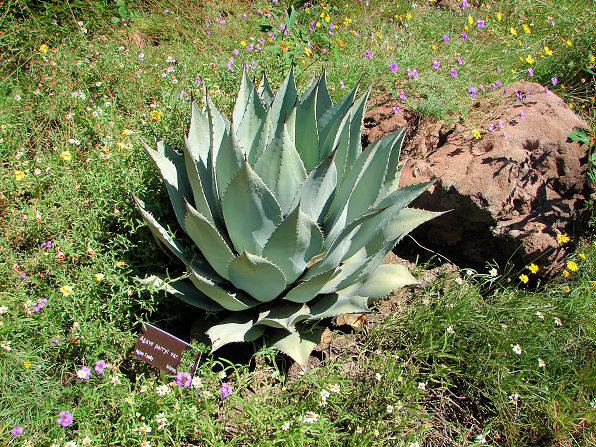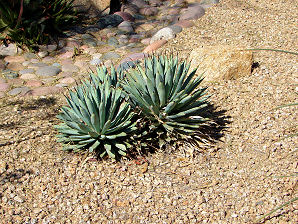Xeriscape Landscape Plants & Flowers
For The Arizona Desert Environment.
Pictures, Photos, Images, Descriptions, & Reviews.
Parry's Agave, Agave parryi var. truncata.
We Are Proud Of Our SafeSurf Rating!
Click On Any Of The Following Links By Amazon.Com
For Books, & Videos About Wildflowers Of Arizona & The Southwest USA. No Obligation!
 |
| Parry's Agave, Agave parryi var. truncata. Boyce Thompson Arboretum, Arizona. September 19, 2006. |
|---|
 | |
| Parry's Agave, Agave parryi var. truncata. | Parry's Agave, Agave parryi var. truncata. |
|---|
Parry's Agave.
We wish to thank Wikipedia, the free encyclopedia for some of the information on this page. We share images and information with Wikipedia. A thick-leafed evergreen succulent which dies after blooming. It has pointed leaves which form a basal rosette. It has a slow growth rate. It becomes very large. Agave parryi var. truncata is found in oak-juniper grassland on the Sierra Papanton on the Durango-Zacatecas border in Mexico at about 7,500 feet elevation. Some people think Agave parryi var. truncata is the Agave grown for tequila. Technically, tequila is a type of mezcal, however all mezcals are not tequila. To be a true tequila, it must be derived from Agave tequilana Weber azul, or more commonly known as the Webers Blue variety of Agave tequilana.The tequila also must be produced in the Mexican state of Jalisco. Mexican laws state that tequila can be produced only in the state of Jalisco and limited regions in the states of Guanajuato, Michoac�n, Nayarit, and Tamaulipas. Mexico has claimed the exclusive international right to the word "tequila", threatening legal actions against manufacturers of distilled blue agave spirits in other countries. We have been to the state of Jalisco and the town of Tequila and you can smell the Agave fermenting for several miles away. You can also see the harvested Agave tequilana Weber azul plants stacked along the roadway or in the fields, waiting to be moved to the fermenting and distilling plants in the region. Mezcal is made from one of 5 or 6 species of Agave. Agave parryi var. truncata, is one used for mescal, not tequila.
Quick Notes:
Height: 3 feet tall. It spreads to about 4 feet.
Flowers: A large stalk emerges from the center of the plant, it becomes 15 to 20 feet tall. Then pink or red buds emerge opening to gold yellow flowers emerge from the stalk.
Flowering Time: Phoenix Arizona, Mid March - April.
Leaves: The leaves are blue - gray or light gray about 1 foot long by about 5 inches across. The leaf margins have dark brown teeth that are curved back towards the base of the plant.
Found: Native of the oak-juniper grassland on the Sierra Papanton at the Durango-Zacatecas border. About 7,500 feet elevation. The USDA claims it is now native to the USA (AZ, NM, TX).
Hardiness: Will freze past the low 15 �F' !
Soil pH requirements:
Sun Exposure:
Elevation: 0 - 7,500 Feet. In Arizona.
Habitat: It grows well in sand, sandy loam, clay and other heavy soils. It needs good drainage and aeration. It is remarkably tolerant of alkali.
Miscellaneous: Maintenance: Low. Photos Taken; Boyce Thompson Arboretum, Arizona. September 19, 2006.
|
We Are Proud Of Our SafeSurf Rating!
Click On Any Of The Following Links By Amazon.Com
For Books, & Videos About Wildflowers Of Arizona & The Southwest USA. No Obligation!
| © 1966 - Present, Audrey, Eve, & George DeLange |
